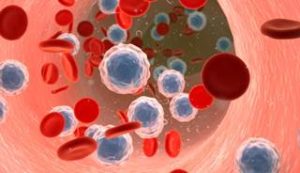- You are here:
- Home »
- Blog »
- integrative therapy »
- Mantle Cell Lymphoma- Lenalidomide, Rituxan plus Integrative Therapies
Mantle Cell Lymphoma- Lenalidomide, Rituxan plus Integrative Therapies

“Lenalidomide (Revlimid) plus rituximab (Rituxan) is a feasible combination that is also safe and active, as initial and maintenance therapy for patients with mantle cell lymphoma (MCL)”
The article linked below could be talking about a blood cancer called multiple myeloma as easily as it is talking about mantle cell lymphoma.
Both blood cancers affect the same age group (65-70), both blood cancers have a five-year survival rate of 48%-50% and according to the article below both blood cancers respond to lenalidomide aka Revlimid. Autologous stem cell transplantation is also a common therapy for each cancer.
Which is why the study below caught my eye. I am both a long-term MM survivor and cancer coach. Study after study for these two blood cancers plays down the importance of collateral damage aka side effects. Not only do I live with a host of side effects incurred during my years of conventional therapies, I have remained in CR from my MM by living an evidence-based, non-toxic, anti-MM lifestyle.
- I have supplemented with curcumin since 2006. Curcumin causes apoptosis to MCL.
- I have supplemented with vitamin D3 for years- Vitamin D3 synergizes with Revlimid against MCL
- Curcumin enhances Revlimid in MM but I can’t find any studies about curcumin, Revlimid, and CML…
I’m not saying that the newly diagnosed CML patient should ignore conventional (FDA approved) therapies. I am saying that nutrition, supplementation, and lifestyle can enhance chemotherapy while moderating toxicity.
Please watch the free webinar linked on the right side of this page. If you have any questions or comments please scroll down the page and post a question or comment. I will reply to you ASAP.
Thank you,
David Emerson
- Cancer Survivor
- Cancer Coach
- Director PeopleBeatingCancer
Lenalidomide Plus Rituximab Safe and Effective as Initial Treatment for MCL
“Lenalidomide (Revlimid) plus rituximab (Rituxan) is a feasible combination that is also safe and active, as initial and maintenance therapy for patients with mantle cell lymphoma (MCL),..
Curcumin nanodisk-induced apoptosis in mantle cell lymphoma
Combination of lenalidomide with vitamin D3 induces apoptosis in mantle cell lymphoma via demethylation of BIK
“Mantle cell lymphoma (MCL) is a currently incurable B-cell malignancy. Lenalidomide (Len) has been demonstrated to be one of the most efficient new treatment options. Because Len and 1α,25-dihydroxyvitamin (VD3) synergize to kill breast cancer cells, we investigated whether VD3 could increase the ability of Len to induce MCL cell death.
While MCL cells were weakly sensitive to Len (1 μM), the addition of VD3 at physiological dose (100 nM) strongly increased cell death, accompanied by slowdown in cell cycle progression in MCL cell lines (n=4 out of 6) and primary samples (n=5 out of 7).
The Len/VD3 treatment markedly increased the expression of the BH3-only BCL2-interacting killer (Bik) without affecting the expression of other Bcl-2 molecules. Immunoprecipitation assays demonstrated that Bik was free from anti-apoptotic partners, Bcl-2 and Bcl-xL, in treated cells.
Moreover, silencing of BIKprevented apoptosis induced by Len/VD3, confirming the direct involvement of Bik in cell death. Bik accumulation induced by Len/VD3 was related to an increase in BIK mRNA levels, which resulted from a demethylation of BIK CpG islands. The sensitivity of MCL cells to Len/VD3 was similar to the response to 5-azacytidine, which also induced demethylation of BIK CpG islands. These preclinical data provide the rationale to investigate the role of VD3 in vivo in the response to Len…”



